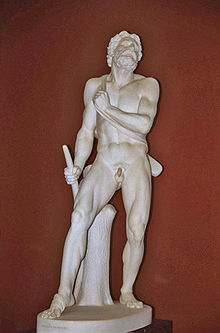Philoctetes (Aeschylus)
| Philoctetes | |
|---|---|

Wounded Philoctetes
|
|
| Written by | Aeschylus |
| Chorus | Men of Lemnos |
| Characters |
Philoctetes Odysseus Others? |
| Date premiered | probably 470s BCE |
| Place premiered | Athens |
| Original language | Ancient Greek |
| Genre | Tragedy |
| Setting | Lemnos |
Philoctetes (Ancient Greek: Φιλοκτήτης) is a play by the Athenian poet Aeschylus. It was probably first produced during the 470s BCE. It is now lost except for a few fragments. Most of what we know of the plot is from the writings of 1st century orator Dio Chrysostom, who compared the Philoctetes plays of Aeschylus, Euripides and Sophocles.
The few extant fragments from the play are not much use in reconstructing Aeschylus' treatment. One fragment mentions that Philoctetes' bow has been hung on a pine tree. Several are of Philoctetes commenting on the pain in his foot, including one in which he longs for death. We do know the broad outline of the plot from a comparison by Dio Chrysostom of the Aeschylus' Philoctetes with Euripides' Philoctetes (431 BCE) and Sophocles' Philoctetes (409 BCE).
Philoctetes is mentioned briefly in Homer's Iliad and Odyssey, and his story was expanded on in Lesches' Little Iliad and Arctinus' Iliupersis. The Greeks had abandoned Philoctetes on the island of Lemnos on their way to Troy because they could not stand his screams of pain and the odor from his wound after he was bitten by a poisonous snake. However, ten years into the Trojan War they found out that Philoctetes and his bow and arrows were required to conquer Troy.
...
Wikipedia
